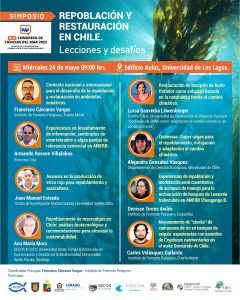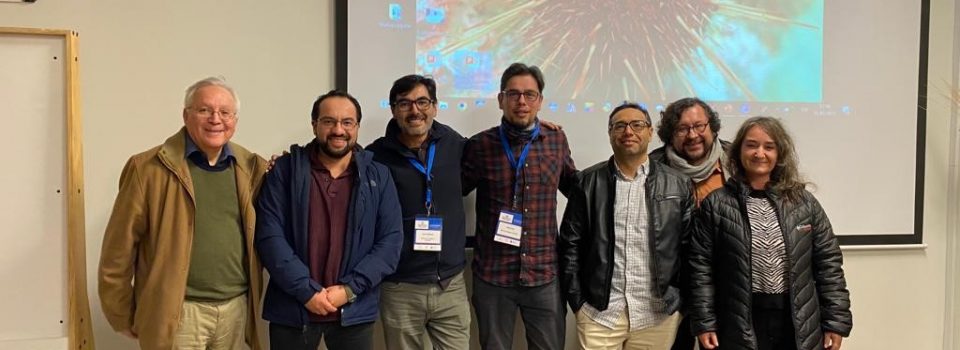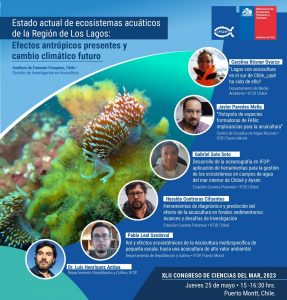Repoblación y cultivo de IFOP, destaca organizando 2 Simposios en el XLII Congreso de Ciencias del Mar
junio 21st, 2023En el marco del XLII Congreso de Ciencias del Mar, realizado entre el 22 y el 26 de mayo en la Universidad de Los Lagos (Campus Chinquihue, Puerto Montt). Se realizaron 2 simposios que contaron con la participación del Departamento de Repoblación y Cultivo, del Instituto de Fomento Pesquero (IFOP).
Estos simposios corresponden:
- “Repoblación y restauración en Chile: Lecciones y desafíos”, realizado el día 24 de mayo y coordinado por el Dr. Francisco Cárcamo Vargas repoblación y cultivo.
- “Estado actual de ecosistemas acuáticos de la Región de Los Lagos: Efectos antrópicos presentes y cambio climático futuro”, realizado el 25 de mayo y coordinado por el Dr. Luis Henríquez Antipa, repoblación y cultivo.
 Respecto al primero, estuvo conformado por investigadores de diversas instituciones, incluyendo de repoblación y cultivo, participando:
Respecto al primero, estuvo conformado por investigadores de diversas instituciones, incluyendo de repoblación y cultivo, participando:
- Dr. Francisco Cárcamo Vargas de repoblación y cultivo del IFOP, Puerto Montt. Presentó “Contexto nacional e internacional para el desarrollo de la repoblación y restauración en ambientes acuáticos”.
- Armando Rosson Villalobos de la Consultora Bitecma Ltda. Presentó “Experiencias en levantamiento de información, sembrados de invertebrados y algas pardas de relevancia comercial en AMERB”.
- Dr. Juan Manuel Estrada del Centro de Investigación Marina Quintay, Universidad Andrés Bello. Presentó “Avances en la producción de erizo rojo para repoblamiento y acuicultura”.
- MSc. Ana María Mora de SECOS, CiCC y Universidad Santo Tomás, Santiago. Presentó “Repoblamiento de macroalgas en Chile: Análisis biotecnológico y recomendaciones para alcanzar la sustentabilidad”.
- Dra. Luisa Saavedra Löwenberger del Centro EULA de la Universidad de Concepción y Proyecto Packard. Presentó “Restauración de bosques de huiro flotador como solución basada en la naturaleza frente al cambio climático”.
- Dra. Alejandra González Vásquez del Departamento de Ciencias Ecológicas de la Universidad de Chile. Presentó “Quimeras: Súper-algas para el repoblamiento, mitigación y adaptación al cambio climático”.
- Denisse Torres Avilés de repoblación y cultivo de IFOP, Coquimbo. Presentó “Experiencias de repoblación y modelación semicuantitativa de acciones de manejo para la restauración de bosques de Lessonia trabeculata en AMERB Chungungo B”.
- MSc. Carlos Velásquez Gallardo de repoblación y cultivo del IFOP, Puerto Montt. Presentó “Mejoramiento de “stocks” de camarones de río en tiempos de sequía: Experiencia con juveniles de Cryphiops caementarius en el norte semiárido de Chile”.
El segundo simposio contó con la participación de investigadores de la División de Investigación en Acuicultura del IFOP:
- MSc. Carolina Rösner Oyarzo del Departamento de Medio Ambiente, Chiloé. Presentó “Lagos con acuicultura en el sur de Chile, ¿Qué ha sido de ello?
- Dr. Javier Paredes Mella del Centro de Estudios de Algas Nocivas, Puerto Montt. Presentó “Hotspots de especies formadoras de FANs: Implicancias para la acuicultura”.
- MSc.Gabriel Soto Soto de la Estación Costera Putemún, Chiloé. Presentó “Desarrollo de la oceanografía en IFOP: Aplicación de herramientas para la gestión de los ecosistemas en cuerpos de agua de mar interior de Chiloé y Aysén”.
- Dr. Heraldo Contreras Cifuentes de la Estación Costera Putemún, Chiloé. Presentó “Herramientas de diagnóstico y predicción del efecto de la acuicultura en fondos sedimentarios: Avances y desafíos de investigación”.
- Dr. Pablo Leal Sandoval de RyC, Puerto Montt. Presentó “Rol y efectos ecosistémicos de la acuicultura multiespecífica de pequeña escala: Hacia una acuicultura de alto nivel ambiental”.
Ambos simposios contaron con alta convocatoria y permitieron un flujo de preguntas que enriquecieron las conversaciones acerca de cada una de las temáticas abordadas. Destacando una discusión activa y constructiva en la que los asistentes realizaron preguntas claves sobre el rol de IFOP como una entidad que provee información para la toma de decisiones del Gobierno de Chile.
Según Francisco Cárcamo el simposio “permitió, luego de muchos años, congregar a instituciones e investigadores que están desarrollando acciones de repoblación y restauración, y conocer de primera fuente, los avances y desafíos multidimensionales de este tipo de acciones. Tanto la repoblación y la restauración pueden jugar un rol clave como estrategias de recuperación de pesquería artesanales y de conservación”.
Por otra parte, el Dr. Luis Henríquez destacó del simposio 2 aspectos clave “En una sesión abierta a la comunidad científica se presentó por primera vez en sesión única los principales resultados de grandes líneas de estudio de la DIA, que buscan de evidenciar el estado de los ecosistemas en términos de conocimiento oceanográfico, impactos en el ecosistema bentónico, floraciones de algas tóxicas, policultivos como estrategias de mitigación y de conservación, además del conocimiento adquirido sobre ecosistemas lacustres.
Este simposio permitirá unificar el conocimiento adquirido en todas las investigaciones de la División con el fin de determinar el estado de los ecosistemas marino y dulceacuícola bajo presión antrópica y generar estrategias ambientales de valor productivo para el país”.

